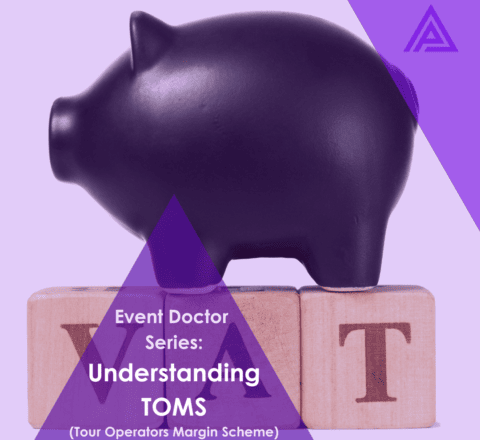Standard VAT Rate:
Under TOMS, you typically apply the standard VAT rate to the profit margin. This rate may vary depending on your country’s tax regulations, but it’s usually the same rate for all your services, making it easier to manage.
Inclusions and Exclusions:
TOMS applies to certain services related to running events, such as accommodation, transportation, and certain activities. However, it doesn’t apply to services like event planning or consultancy, which are usually subject to regular VAT rules. So, it is purely there for the added extras of ‘Travel Service’ – listed above.
Customer Invoices:
When you invoice your clients, you typically include the total price of the event package, including VAT, if applicable. You’ll then account for the VAT under TOMS when you file your tax returns. The margin is estimated monthly or quarterly and calculated precisely once a year.
Record-Keeping:
It’s crucial to keep accurate records of your transactions, including the costs you incurred and the income you generated from the event packages. This will help you correctly calculate your VAT liability under TOMS.
TOMS simplifies the way VAT is applied but it’s essential to understand the specific rules and regulations in the country you operate from, as they can vary, and consulting with a tax professional or accountant is advisable to ensure compliance.
Q – Is TOMS compulsory? A- Yes…
TOMS is a compulsory VAT accounting scheme for those that fall within the criteria, so considering recent (and forever changing) developments, businesses should take stock, and consider whether they could be affected by TOMS, now or in the future.
In the UK, Under TOMS, the taxpayer accounts to HMRC for output tax on the margin. Input tax on costs of sales is not deductible. Input tax on overheads is deductible as is input tax on inhouse costs.
The main advice would be to check no changes to TOMS have been implemented as a first step. This could affect event organisers who operate from the UK into the rest of the EU member states.
Cross-Border Considerations:
If your event organisation operates in multiple EU member states, be aware of cross-border VAT implications and any special VAT rules that apply in each country.
Consult a VAT Expert:
Given the complexity of VAT rules, consider consulting with a VAT expert or tax advisor who specialises in EU VAT regulations to ensure compliance.







